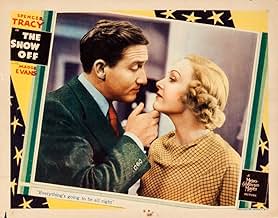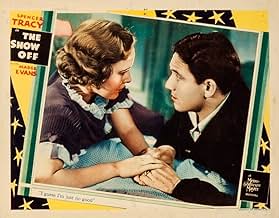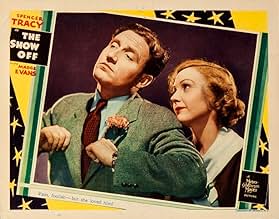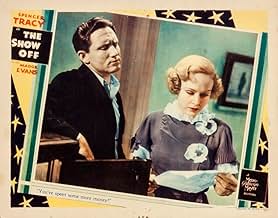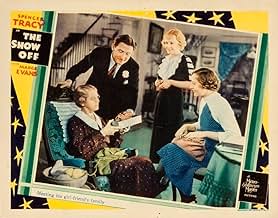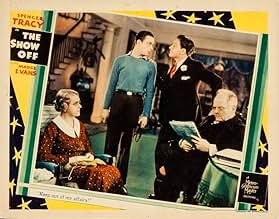Füge eine Handlung in deiner Sprache hinzuAubrey cons Amy into thinking he's a railroad bigwig. After they marry Aubrey overspends in setting up their home. When their financial situation gets dire they go back to her parents house ... Alles lesenAubrey cons Amy into thinking he's a railroad bigwig. After they marry Aubrey overspends in setting up their home. When their financial situation gets dire they go back to her parents house until Aubrey changes his ways and they can get on stable footing. When he loses his job he... Alles lesenAubrey cons Amy into thinking he's a railroad bigwig. After they marry Aubrey overspends in setting up their home. When their financial situation gets dire they go back to her parents house until Aubrey changes his ways and they can get on stable footing. When he loses his job he takes one wearing a sandwich board. After he helps Joe sell his patent for a good price a... Alles lesen
- Regie
- Drehbuch
- Hauptbesetzung
- Auszeichnungen
- 1 wins total
- Jimmy
- (Nicht genannt)
- Andrew Barnabas
- (Nicht genannt)
- Mrs. John Preston
- (Nicht genannt)
- Excursion Boat Passenger
- (Nicht genannt)
- Elevator Operator
- (Nicht genannt)
- Ship #1 Officer
- (Nicht genannt)
- Perry
- (Nicht genannt)
- Automobile Attendant
- (Nicht genannt)
- 2nd Drunk
- (Nicht genannt)
- Mr. Weitzenkorn
- (Nicht genannt)
Empfohlene Bewertungen
Piper continually lies to make himself look bigger in other people's eyes but really succeeds only in making himself feel better. They nearly always disbelieve and ridicule him. (The exception being his fiancee, then wife, Madge Evans, who romanticises him and finds out her mistake only after marriage.) True, the wife eventually tells him that he is not a man, and his mother-in-law, Clara Blandick, the sourball to end all sourballs, is always sending hilariously scornful put-downs his way. But on the whole the movie regards Piper with tolerant affection.
But if we look at Piper seriously, what is he? A man who causes his wife worry and distress so that he can sustain the fiction of wealth and generosity. A man to whom other people are no more than an audience. One might affectionately tolerate a six-year-old who carried on as Aubrey does, but the way this man ignores reality and people's feelings make him more of a psychopath than a show-off.
What is ironic is that Kelly in fact had got hold of one of the big changes in American life but came at it from the wrong angle. The Twenties was when promotion began to be a powerful force, when fast talk and ballyhoo triumphed over sober reality, and advertisers learned to sell not the steak but the sizzle. But this idea is conveyed far better by characters such as Lee Tracy and James Cagney, who gleefully carried off stunning feats of well-plotted chicanery. Aubrey Piper, on the other hand, with his inept schoolboy antics, grinning and patting himself on the back, is just a loudmouth amateur.
One reviewer has mentioned that this characterisation is a big change from Spencer Tracy's usual solemnity. If you want to see a manic Tracy whom you can regard with affection, look for The Actress, Ruth Gordon's story of her early years. He plays her manic and utterly lovable papa.
Watching The Show-Off today I thought of two early television characters that Tracy reminded me of. A little bit of Phil Silvers as Sergeant Bilko and a whole lot of Jackie Gleason as Ralph Kramden.
The film is of course based on George Kelly's play of the same name and in doing a little research on Kelly I found there was a live production on television in the Fifties that starred none other than Jackie Gleason. Red Skelton did a remake of this as a feature film, but I hope that Gleason's performance is not lost and a kinescope of the performance exists and is preserved.
Tracy's a lovable mug with a gift for gab who like Ralph Kramden had every big scheme blow up in his face. And he's got his Alice here in the person of Madge Evans who Audrey Meadows could have played in a remake. Tracy's not a womanizer here, he really does love Madge and she him. But Madge is about at her wit's end with him.
During the course of things they have to move back with her mother. You remember Ralph's mother-in-law? Clara Blandick almost steals the film as Madge's mom who cannot stand her son-in-law. Like Bilko and Ralph he's always "on" all the time. I know I couldn't stand living with someone like that.
Tracy gives it a good try and the cast does well. But maybe the film needed a Norton character.
J. Aubrey Piper (Spencer Tracy) is an office clerk working for a railroad and out on an excursion boat when a man falls overboard. Piper jumps in and saves the man, winning the attention and interest of Amy Fisher (Madge Evans), the daughter in a respectable middle-class family. Aubrey is a bag of wind like the biggest hurricane you've ever seen, but Amy oddly seems blinded to all of this blustering. She doesn't seem to notice that although Aubrey always takes her out in the most fashionable of cars that it's always a different one every time - a "demonstration model". This was a custom years ago of letting people with no credit history drive new expensive cars around to see if they liked them enough to buy them. The problem is, the rest of Amy's family knows exactly what Aubrey is and they cringe every time he comes around, always with a big appetite and a tale overblowing his own importance.
Amy and Aubrey get married, and soon the problems begin. Amy's problem is not suddenly discovering that her husband is a liar, because he really isn't. He doesn't lie about his occupation or income, he just blows out of proportion his own importance in every event that occurs. Thus the death of their marriage is slow suffocation from a thousand disappointments - things bought on credit when Amy thought they were paid for, bills unpaid, wage attachments - all because Aubrey really believes his ship is about to come in although he has no plan as to how and why.
This one ends in a way that you wouldn't expect for an MGM movie in the 1930's that seems to be teaching a tale about the need for humility and realism, and maybe that was because in 1934 the last things Americans needed in the Great Depression was humility and realism in what is supposed to be a comedy.
I'd recommend this one as an opportunity to see Spencer Tracy early in his career in a very likable little film. In the hands of a lesser actor you'd probably just want to strangle Piper, but Tracy gives even this shallow fellow enough depth that you'll likely feel at least a little sympathy for him at points. I know I did.
*** (out of 4)
J. Aubrey Piper (Spencer Tracy) is the ultimate blowhard, a man who never stops talking about everything great he's done yet he never realizes that he's never done a single worthwhile thing in his life. He eventually marries a girl (Madge Evans) but the two soon find themselves in debt with Aubrey losing more and more. He's eventually without a job and when his wife leaves him he must try and find someway to save face. This isn't the greatest comedy ever made as the direction is a bit sloppy and the screenplay has a few loose ends but what makes this thing so special is the performance by Tracy in his first role for MGM. This character is without question one of the biggest idiots in the history of cinema and if this person was involved in your real life even the most civil person would probably have to fight themselves in not punching him in the face. Aubrey is constantly telling lies, trying to make himself look better than he is and more often than not his lies end up costing other people their happiness. Apparently Lee Tracy was originally set to play this part but after his legendary incident in Mexico during the filming of VIVA VILLA! he was let go and Tracy got the part. This was certainly a great thing because I don't think there's another actor in the history of cinema that could have brought this character to life. Tracy's powerful attitude and strong voice brings this character to life and one can't help but overlook the character's flaws simply because of how magnificent the actor is. There's a running joke about the character being in one room but talking so loud that you could hear him a block away and even this is perfectly done by Tracy. The way he gives that powerful voice just takes over a room and you can't help but feel as if Tracy is this character. The mannerisms are perfect, the walk he gives and even the way he laughs at his own jokes. This certainly isn't Tracy's greatest work as an actor but I'd be willing to say it's one of the most memorable characters he has created. Evans is also extremely good as the suffering wife and we get strong supporting work from Grant Mitchell, Clara Blandick, Henry Wadsworth, Lois Wilson and Alan Edwards. I'm sure many will watch this film and just want to kill the Aubrey character and I'm sure many will hate the film simply because they hate this guy. I certainly understand this as there were times where I was hoping someone would do bodily harm to him. However, Tracy is just so terrific in bringing this character to life that I have no problem recommending the film.
Wusstest du schon
- WissenswertesThe part of J. Aubrey Piper was originally to be played by Lee Tracy, but his contract was terminated by MGM when, during the production in Mexico of Schrei der Gehetzten (1934), he got drunk, urinated off a balcony onto a passing patrol of Mexican soldiers (who almost shot him) and was deported from Mexico. Spencer Tracy got the part with the help of Frank Morgan, and afterwards signed a long-term contract with MGM.
- PatzerThe contract that Aubrey signs, with such extraordinary consequences, would not be binding because he had been given no authority by the company to make it.
- VerbindungenReferences Poor Aubrey (1930)
- SoundtracksHappy Days Are Here Again
(uncredited)
Written by Milton Ager and Jack Yellen
Whistled by Spencer Tracy
Top-Auswahl
Details
- Laufzeit1 Stunde 17 Minuten
- Farbe
- Seitenverhältnis
- 1.37 : 1

